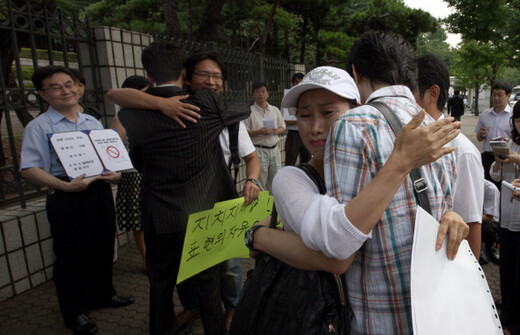hankyoreh
Links to other country sites 다른 나라 사이트 링크
Arrest warrant sought for six accused of leading newspaper ad boycott

With a court set to review a request by prosecutors to issue a warrant to arrest six Internet users, who are alleged to have led a campaign to persuade companies to stop placing ads in three conservative newspapers, the Chosun Ilbo, JoongAng Ilbo, and DongA Ilbo, the most critical issue is whether the six people conspired with other Internet users to obstruct the advertisers’ business.
The prosecution sought an arrest warrant August 19 for the six Internet users, who they are charging with obstruction of business for allegedly posting a list of the companies that advertise in the three conservative dailies on the Internet community site “National Campaign for Sovereignty of Media Consumers” and asking visitors to the site to call the companies. The 39-year-old creator of the site, who is only identified by the surname Lee, is among the six charged, all of whom are members of the site.
Prosecutors investigating the case are applying the obstruction of business charge because of the possibility that the Internet users may have conspired with other Internet users, rather than on the idea that the six directly blocked business.
Kim Su-nam, a senior prosecutor at the Seoul Central Prosecutors’ Office, said on August 20, “Some of the six people charged telephoned the companies directly, but it was just one or two calls.”
The prosecution concluded that the six Internet users had “agitated and instigated (individual acts) of obstructing business” by posting a list of the advertisers and related messages on the Internet community site, which has more than 50,000 members. The prosecution ruled that the six Internet users conspired with other Internet users, who made more than 1,000 calls a day to one company in particular.
However, some within the prosecution say that it is inappropriate for the six Internet users to be charged with obstruction of business, given the criminal law. An official with the prosecution said, “To prove that the six people conspired to commit the act, prosecutors will have to prove that they telephoned the businesses after having found the list of advertisers on the Internet community site.”
If individual Internet users telephoned the advertisers on their own, after seeing a newspaper ad, for example, rather than after having found the list posted on the media consumers campaign Web site, it would be difficult to find the six Internet users guilty of having conspired with them to obstruct the advertisers’ business.
There is some precedent for this line of thinking. A Supreme Court ruling states that posting objective information on Internet bulletin boards, even if it obstructs business, cannot be construed as fraud.
When asked whether they had secured testimony from individual Internet users stating that they had telephoned the advertisers after seeing the list on the Internet community site, however, prosecutors replied that they “did not need to do so.”
Attention is now focused on the Seoul Central District Court, which is scheduled to review the case on August 21 and will decide whether to issue an arrest warrant for the six Internet users. Observers say the court’s decision could offer a glimpse into the judicial system’s take on the recent series of hard-line measures carried out by the government and the prosecution against Internet users and broadcasting companies.
Attorneys for the six Internet users say that the arrest warrant should not be issued because of the difficulty of proving the charge and none of those charged are a flight risk.
Please direct questions or comments to [englishhani@hani.co.kr]
Editorial・opinion
![[Editorial] Does Yoon think the Korean public is wrong? [Editorial] Does Yoon think the Korean public is wrong?](https://flexible.img.hani.co.kr/flexible/normal/500/300/imgdb/original/2024/0417/8517133419684774.jpg) [Editorial] Does Yoon think the Korean public is wrong?
[Editorial] Does Yoon think the Korean public is wrong?![[Editorial] As it bolsters its alliance with US, Japan must be accountable for past [Editorial] As it bolsters its alliance with US, Japan must be accountable for past](https://flexible.img.hani.co.kr/flexible/normal/500/300/imgdb/original/2024/0417/6817133413968321.jpg) [Editorial] As it bolsters its alliance with US, Japan must be accountable for past
[Editorial] As it bolsters its alliance with US, Japan must be accountable for past- [Guest essay] Amending the Constitution is Yoon’s key to leaving office in public’s good graces
- [Editorial] 10 years on, lessons of Sewol tragedy must never be forgotten
- [Column] A death blow to Korea’s prosecutor politics
- [Correspondent’s column] The US and the end of Japanese pacifism
- [Guest essay] How Korea turned its trainee doctors into monsters
- [Guest essay] As someone who helped forge Seoul-Moscow ties, their status today troubles me
- [Editorial] Koreans sent a loud and clear message to Yoon
- [Column] In Korea’s midterm elections, it’s time for accountability
Most viewed articles
- 1‘Right direction’: After judgment day from voters, Yoon shrugs off calls for change
- 2[Editorial] Does Yoon think the Korean public is wrong?
- 3Where Sewol sank 10 years ago, a sea of tears as parents mourn lost children
- 4[Editorial] As it bolsters its alliance with US, Japan must be accountable for past
- 5Strong dollar isn’t all that’s pushing won exchange rate into to 1,400 range
- 6[Guest essay] Amending the Constitution is Yoon’s key to leaving office in public’s good graces
- 7Japan officially says compensation of Korean forced laborers isn’t its responsibility
- 8US, Japan and China move to become self-sufficient in semiconductors
- 9In 50 years, half of Koreans are expected to be 65 or older
- 10[News analysis] Watershed augmentation of US-Japan alliance to put Korea’s diplomacy to the test